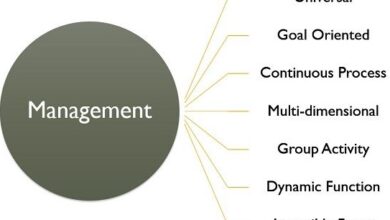What is Egocentrism and Characteristics of egocentric people
Egocentrism
Egocentrism is the tendency to focus attention on one’s own interests and needs, without paying attention to the point of view and interests of others.
Thus, people with a high level of egocentrism not only place the satisfaction of their own needs and desires as the target of almost all their actions; moreover, they don’t even consider others when benefiting them would cost them nothing. In short, egocentrism does not consist so much in taking advantage of others for one’s own interest, but it is simply not taking into account the interests of others, except if this helps to meet one’s own needs. It is as if the part that allows us to connect emotionally with others is missing from the egocentric way of thinking and thanks to which we do not have to put effort into imagining what those around us want and do not want.
Interestingly, this does not mean that self-centered people cannot empathize with anyone. It means, rather, that they don’t spontaneously do it , unless the evidence that what they have done has harmed others is very clear, or unless they deliberately think about what others want. the rest.
On the other hand, it is important to keep in mind that egocentrism is a gradual phenomenon. In other words, there are very few people who are 100% self-centered, but rather most people have certain expressions of self-centeredness in certain contexts, and the only thing that changes is our propensity to leave it reflected in our actions frequently and very clearly. For this reason, the concept of “pure” egocentrism that we are talking about here, in practice, is very rare among the population, and rather forms a reference to learn to detect this kind of behavior patterns.
Characteristics of egocentric people
These are some of the characteristic traits of people with a high level of egocentrism.
1. They almost always speak from their point of view
Egocentric people experience some problems negotiating or engaging others when speaking, because they rarely take other people’s perspectives. This makes the content of his speech appear, at times, banal, since it does not appeal to the real interests of the rest; always has the Self as a point of reference.
2. They do not like to share
For people with a marked egocentrism, sharing means losing part of what they took for granted they would have. For this reason, they do not like it, and by default they will not raise the possibility that they share something with others, unless they believe that this will bring them clear benefits in another aspect of life.
3. They manipulate others more often
Another of the characteristics associated with egocentrism is the ease with which one falls into situations of manipulation of others . Sometimes even believing that it is for the victim’s own good (by not stopping to think about the possible reasons why that victim could really be harmed by being in that situation).
5. They do not respect the space or moments of others
Egocentric people interrupt more and invade the space of the rest of the people more, because on many occasions it does not even occur to them that this exists and must be respected. This exposes them to the creation of conflicts, many times without realizing it.
Egocentric People: An Example of the Egocentric Personality
Let us think, for example, of a person who is in a train carriage and needs to get off at a stop, but it is difficult for him because there are many people crowded in front of the door. Someone who is not significantly self-centered will probably communicate in some way that they would like to be let through, and that for this he needs to be moved out of the way. On the other hand, someone with tendencies towards egocentrism will rush to the door without thinking too much about it, making movements to push away whoever is in front of them, and only when they see the reactions of disgust and surprise from others will they realize that what they has done has been wrong, and has harmed others.
What are the main problems due to excessive egocentrism?
As we have already anticipated, the main area of life in which egocentrism gives rise to problems is that of personal relationships. It is normal for this to be the case, because the main characteristic of the tendency to be an egocentric person is to think only of oneself when one should also be thinking of someone else, or of a group or collective.
Now, let’s see in a more detailed way what those problems are.
1. Predisposition to suffer love disappointments
Relationships are often conflictive for self-centered people. Either they strain coexistence too much because they ignore the interests and opinions of the other person, or they feed dynamics of dependency or submission on the part of the other person that, in addition to generating discomfort in them, sooner or later explodes in the form of a crisis. or directly break. In addition, it is common that when this happens they do not understand what has happened (because they have not even considered the problem of their actions) and they see themselves in a position of victim.
2. Lack of empathy
The lack of empathy is reflected in the way of communicating and reacting to what others communicate about how they feel. It is a lack of tact that makes many social interactions unpleasant, because very egocentric people, in addition to being more likely not to pay too much attention to what is being said, tend to focus on the literalness of the message, I would say. that is implied through non-verbal language, context, etc.
3. Tendency to wishful thinking
Wishful thinking, or “wishful thinking“, consists of developing beliefs based more on one’s own desires than on evidence. In the case of people with a marked egocentrism, this usually occurs when they assume that certain facts or circumstances will be accepted by others without having hardly any evidence or indications of this. This gives rise to misunderstandings and conflicts.
4. Tendency to make plans without taking into account the rest of the people involved
This problem is a derivation of the previous one: egocentric people can aspire to maintain leadership roles, but once they reach that position, they trigger many conflicts due to not agreeing and negotiating things sufficiently with the parties involved, assuming that the The simple fact of being leaders (formally or informally) already gives them a position from which to decide everything.
Signs and symptoms of a self-centered person
The high levels of egomania of people are reflected in this type of actions and psychological predispositions:
- High tendency to adopt strategies to improve one’s own image (makeup, select clothing by the standards of their social reference group, etc.).
- Tendency to tackle projects for which one is not trained.
- Need to improve one’s own image in the face of criticism from others.
- Tendency to lie to others when talking about oneself, to improve one’s social projection.
- Tendency to hide their moments of vulnerability.


